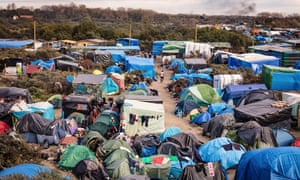At least three teenage refugees who arrived in Britain from the migrant camp in Calais have killed themselves in the past six months, raising questions about how the Home Office and local authorities handle profoundly vulnerable asylum-seeking children and young people in the UK.
Three young men from Eritrea, two of them aged 18 and one aged 19, have taken their own lives in London since last November. All of them fled conflict in Eritrea, travelling without their parents across Africa and Europe as young teenagers, and all spent time in the Calais migrant camp. A fourth young asylum seeker from Eritrea whose name and age has not been made public is also known to have killed himself last year.
An inquest was held into Yemane’s death in April. It highlighted that he was in a state of crisis in the 24 hours before he took his own life, and found that although employees at the sheltered accommodation where he lived had reported a deterioration in his condition to NHS mental health staff, their concerns were not “escalated appropriately within the crisis team”. A pre-inquest hearing was held into Tekle’s death last month; there is no date yet for the full hearing, and no scheduled inquest yet into the third young man’s death.

In the absence of other inquest findings, it is impossible to assess what prompted the three teenagers, who were acquainted with each other, to end their lives. All of them had been through extremely traumatic experiences, having fled conflict and encountered multiple dangers on the way to the UK, not least in the often violent environment of Calais, and risked their lives when they attempted to enter Britain by smuggling themselves on to lorries and trains. However, people who knew them have said that they subsequently found the protracted process of applying for refugee status in the UK extremely stressful.
Hamid, another Eritrean asylum-seeking teenager, who knew all three teenagers, said Alexander Tekle and N, the young man who killed himself last month, were both extremely concerned about the length of time it was taking for the Home Office to decide on whether they would be granted refugee status here. Hamid asked for his real name not to be printed, afraid that speaking out might somehow complicate his own asylum claim, which still remains unresolved, three years after his arrival in the UK at the age of 15.
He said: “Alex and I were close friends. He was such a nice guy but he was giving up on life. He was stressing about Home Office things – we all were. I tried to tell him not to worry too much, but he was thinking about it all the time. He was saying: once you have your papers, you can start your life, you can start college. He wanted to start work; he wanted to send money to his mother. Without papers you can’t work.”
He was unsure about whether Yemane had ongoing concerns about his Home Office status, but he knew that the third young person, N, was very anxious about whether he was going to be accepted as a refugee. “He was worried about Home Office and being sent back to his country and stressing about that,” he said.
The Home Office is understood not to be currently sending people back to Eritrea, because it is considered too dangerous; however child asylum seekers who turn 18 and are not granted refugee status remain in limbo, unable to work, or study, and liable to be sent to immigration detention centres if they do not leave the country voluntarily.
Benjamin Hunter met Tekle while doing volunteer work with refugees in Calais when Tekle had just turned 16. He stayed in touch with him when he travelled to England. “Alex experienced deeply traumatic events on his journey to the UK, in particular in Libya and in Calais, where he lived alone in a tent for as long as a year, subject to abuse and neglect,” Hunter said.
Tekle was wrongly age-assessed on arrival in the UK; it was not easy to get his birth certificate sent from Eritrea, although the documents were eventually sent. For a while he was treated as an adult, and sent to live in a unit for adults where he experienced real difficulties, Hunter said. Since arriving in the UK Tekle had at times been homeless, and occasionally drank heavily as a way of alleviating the stress, Hunter said.
“Instead of receiving the support and help that he desperately needed, upon his arrival in the UK, he told he was not eligible for support as a child or care-leaver. He was placed outside of care, in a hostel for adult asylum seekers where he was violently assaulted,” he said. “Alex was stressed about the wellbeing of his family, about the uncertainty of his future and in particular was stressed by his asylum claim and the thought that he might be deported. The last thing he said to me, the day before he died, was, ‘Why have I not received my papers, like my friends have?’”
His father, Tecle Sium Tesfamichel, a refugee now living in Sudan, said: “Alexander is not coming back. But I want to know this doesn’t happen to children and young people again. These children, who have to leave home through no fault of their own, are traumatised on their journey through the desert and the sea. It is the job of the authorities to look after and guide these children, who come to the UK alone. They shouldn’t come to die.”
The family’s lawyers, Bhatt Murphy, would like the coroner to examine the actions of the local authorities responsible for him, the adequacy of his accommodation, of the age assessments, and of access to mental health services.
An Eritrean woman who works with young asylum seekers (who asked not to be named) said she observed many different pressures making life hard for newly arrived teenagers. “The journey, then the welcome and reception they get here is not what they expected,” she said. “They feel like they are unwanted.
“Everything is so different from how they have lived at home. The loneliness, the language barrier; they are placed in accommodation with no one to talk to.”
The mental health problems experienced by unaccompanied asylum-seeking children have been well documented by refugee organisations and children’s charities.
Sam Royston, policy director at the Children’s Society, which has been carrying out new research into the mental health of unaccompanied asylum-seeking children in the UK, said: “These vulnerable young people may have experienced the trauma of war, persecution, bereavement and exploitation, all of which can have a huge impact upon their mental health. Too often, they do not get the help they need … Practitioners we spoke to knew of young people who had sadly self-harmed and attempted suicide.”
A study by the children’s commissioner last year warned that Home Office delays in processing asylum claims were causing difficulties. “Testimony from migrant children demonstrates how the experience of uncertainty and waiting leads to a state of paralysis and depression, seriously undermining their wellbeing,” the report states.
Elaine Chase, an academic who has interviewed more than 60 unaccompanied young migrants in the UK for the research project, Becoming Adult, said about a third of the people she spoke to had experienced mental health difficulties ranging from difficulties sleeping, anxiety, severe depression to suicidal feelings, often related to uncertainty about their Home Office status. “One 18-year-old attempted suicide and ended up in a mental health unit, and was then billed for his healthcare and told he had to leave the country,” she said.
Her colleague on the research project Jennifer Allsopp said the migrants interviewed tended to be more troubled about the uncertainty they faced about their futures than by the trauma they had experienced in the past. “For them, good mental health is associated with being able to work towards future aspirations; having a sense of stability, moving onwards with their lives. It is very hard to do that, if not impossible, without security of legal status,” she said.
Rosalind Compton, an immigration solicitor with the charity Coram Children’s Legal Centre, who runs advice sessions for asylum-seeking children, said many were under extreme stress. She said she knew an 18-year-old who had attempted suicide in December after being refused asylum. “There needs to be significantly improved mental health support available for all asylum-seeking young people,” she said. “Mental health support is delayed or made ineffective by Home Office delays.”

Liz Clegg met Alexander Tekle during the two years she spent working in Calais, supporting child migrants in the camp. She now runs a centre in Birmingham to support those who have arrived in the UK. “He was lovely. I remember him getting in the car and singing along to the radio. He came across like a genuine, funny, sociable boy,” she said. She said many young people were destroyed by spending a long time in Calais trying to get to Britain. Those who spent only a few days in the camp tended to be in a better state when they arrived here.
“It had a profound effect on them and then there’s a delusional notion that it will all be OK when you get to the UK. That can be the final nail. You’ve held on and held on, you’ve kept going and you’ve got here, and then you realise that the dream is not the dream,” she said.
Britain gives temporary leave to remain to all minors who arrive here, but those who are found ineligible for refugee status are asked to begin making plans to return to their home country when they turn 17 and a half. Many of them struggle to gather the correct evidence to show that they should be eligible for refugee status; it can be difficult to access legal advice. “You have to have evidence that you need refugee protection,” Clegg said.
“It’s a nightmare process, and they don’t understand it. None of these children read the Geneva convention or had the slightest idea of the asylum process. For many of them, they so believed that they could get to the UK and everything would be all right, and then they get rejected. It’s hugely stressful. The whole hostile immigration environment is turned towards them. If you are told you can be here only until you are 17 and a half, it’s inhumane – it’s a form of abuse.”
A Home Office spokesperson said: “We recognise that some unaccompanied asylum-seeking children have fled persecution in their countries of origin and experienced potentially dangerous journeys before reaching the UK. We are committed to reaching asylum decisions as quickly as we can, while ensuring these often complex cases are given proper consideration. Unaccompanied children are looked after by local authority children’s services, who are required to assess their individual needs, including access to mental health support.”
Hamid, who has seen three teenagers in his circle take their own lives in the space of six months, said he still struggled to understand why they decided to give up on life. “Alex was so generous, he would give me his last money; he gave me his clothes. If he had only £1 he would buy two drinks – one for him and one for you. He would share everything with you.”
He remains extremely concerned about his own immigration status and has recently received a Home Office letter informing him that he is a “person without leave”, liable for detention and possible removal from the country. The letter states: “You are not allowed to WORK. You are not allowed to STUDY.”